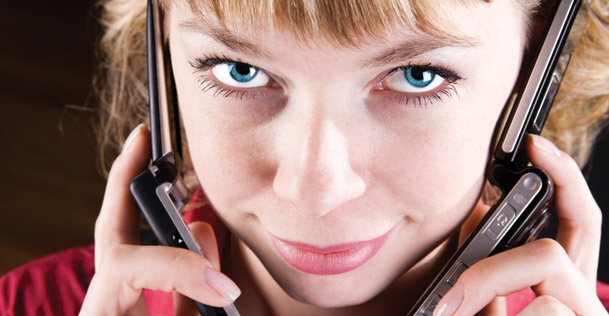Sometimes I dream I’ve lost my iPhone. I’m adrift in the universe, cut off from my Facebook, Google, Twitter, email, texting, YouTube, livestream, and camera apps. It’s a terrifying prospect.
Like millions of Americans, I’m unashamedly addicted to my silicon-stuffed little slab. In just 10 years’ time, smartphones have managed to both transform and torture our culture (and me). These days, rather few of us can get to the morning’s first cuppa without reflexively checking in with our iOS- or Android-powered phone. Pathetic, eh?
Yet there are perfectly decent people — maybe you’re among them? — who dismiss smartphones, or even resent them. They just want to be left the hell alone by the millions of buzzing, beeping, and vibrating apps that are the signature of these pricey devices. Why? Because they don’t see the point of having massive processing power — not to mention GPS tracking — in the palm of their hand.
For some consumers, of course, cost is a hang-up, especially as you can grab a sweet little flip phone or bar-style model for under 20 bucks. Ramon Llamas, a market research analyst at IDC, which focuses on mobile-phone trends, told me the choice of a basic phone over a do-everything smartphone “really just comes down to one thing: cost.” Except that does not really tell the entire story.
Nancy Wintner, a veteran PR consultant in Pittsburgh, represents another perspective. “I have no interest in carrying my computer around in my purse,” she said to me, emphatically. She uses a bar phone that has limited functionality. “It meets my needs. I don’t feel disconnected from the world. I can always just pick up the phone and make a call.”
People like Wintner are not necessarily tech-averse outliers. They merely “choose to avoid the constant bombardment of information,” Bob O’Donnell, chief analyst at TECHnalysis Research, told me.
Others, according to O’Donnell, avoid smartphones largely because they cling to an old-fashioned notion of independence. “They’ve chosen to walk away from the overwhelming connectedness of modern life. It’s a retro thing.” These are the same folks who are drawn to the resurgence of vinyl records. “They are making a philosophical statement,” O’Donnell said.
Not surprisingly, one finds a diminishing number of smartphone users in the upper age ranges — but not by much. Until about the age of 75, O’Donnell said, people are generally willing smartphone users. After that, less so.
Someone like Snow Philip, a part-time journalist in Key West, Florida, is, at 74, right on the cusp. Philip owns a smartphone — it was a gift — but she’s packed it away. “I think it would complicate my life, which is full and rich. I don’t want to be as obsessed as everybody else, Facebooking and Twittering all the time,” she said when I called her on her landline. “It’s very unattractive to me.”
And then we have the last of the BlackBerry hangers-on, those stubborn few. Their devices today incorporate some smartphone-style goodies but are sparer by far. Among the most high-profile proponents is Michelle Kosinski, White House correspondent for CNN. Maybe you’ve seen her tapping away on her little BlackBerry in the White House briefing room. “I really love its simplicity and the [physical] keyboard,” Kosinski told me. “Emotionally, when I touch it, I think through it. And iPhone apps just annoy me.”
Most others in the White House press corps “have conceded defeat,” Kosinski said of the once ubiquitous BlackBerrys, but she’s in until the bitter end. Just in case, she’s stashed a bunch of older models in a drawer at home. “It may be the longest relationship I’ve ever had,” she said to me with a guilty giggle.
To those of us who love our phones to excess, Kosinki’s sentiment, though intended to be cute, has the sad, unmistakable ring of truth.
Cable Neuhaus writes about popular culture and media.
Become a Saturday Evening Post member and enjoy unlimited access. Subscribe now




Comments
It really isn’t a matter of “denial” or “resistance”, its largely lack of interest coupled with the VERY sub-par user experience vis-a-vis a real computer. The computer has a “real” keyboard, a “real” pointing device, a “real” operating system, and most importantly, a “real” screen with plenty of “real” estate! The smartphone is an overpriced gadget which is a jack of all trades, and a master of none. A mediocre phone at best, and a HORRID computer.
I get the feeling that most people have forgotten that every smartphone comes with an on/off button! When I really want to be left alone, I just turn the phone off. I don’t have to worry about missing anything because when its turned back on, any incoming calls or texts show up immediately, and I can take care of them at my leisure.
And of course, don’t forget the “airplane mode” which also is a useful alternative to being besieged when you want to be left in peace.
The hard of hearing [HOH] user has several problems in confronting cell phone use. We are not allowed to “test drive” any cell phone to see if we can actually HEAR the calls on it, we have to BUY it to try it. Privacy is an issue when we have to ramp up sound to hear it, embarrassing to us and annoying to others nearby. But voice clarity and distortion are the main issues, both receiving and sending. You can always text EVERYTHING but let’s face it, the older you get the more arthritis interferes with that.
If hearing aids are part of your HOH life, they may have a telecoil program that can pick up the signal from the cellphone directly IF you hold the phone in EXACTLY the correct position close enough to the aid AND fluorescent lights or other electronics in your environment don’t interfere with it! There are newer hearing aids that can receive calls wirelessly transferred from your cellphone, IF the aid is compatible with the phone itself or another pocket-sized device that acts as a go-between. But with the go-between you are juggling 2 devices just to communicate. So, whether you are HOH and aware of your hearing loss or not, cell phones can be a huge challenge and inconvenience to use physically, above and beyond how connected you actually want to be. As Bob MCGowan Jr. comments, life is stressful enough. I can’t afford to spend lots of $, time, and energy finding a cell phone that works seamlessly with my hearing aids; they cost enough as it is.
Very enlightening article. The bottom line is doing your homework on what kind of phone you need, with the features you need for the right price. It’s worth it to take your time, and not get overwhelmed by the choices and process involved in deciding. It can be daunting; especially the mind-numbing fine print and contracts.
Life today is stressful and overwhelming enough as it is. If your smartphone isn’t making your life easier, it at least shouldn’t be making it worse. The start of the New Year is a good time to honestly re-evaluate things if you’re unhappy with your current phone and/or plan.
Sorry to say, but Blackberry’s as of 2013 are proper smartphones, in many ways more advanced than their iPhone and Samsung counterparts. I can’t name one smart phone maker with more variety of products. Please more accurately reflect the current landscape.